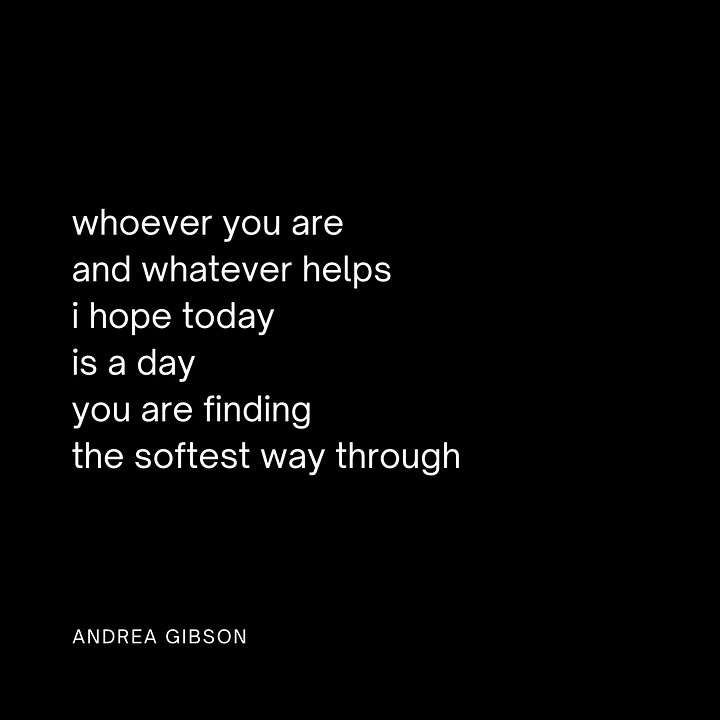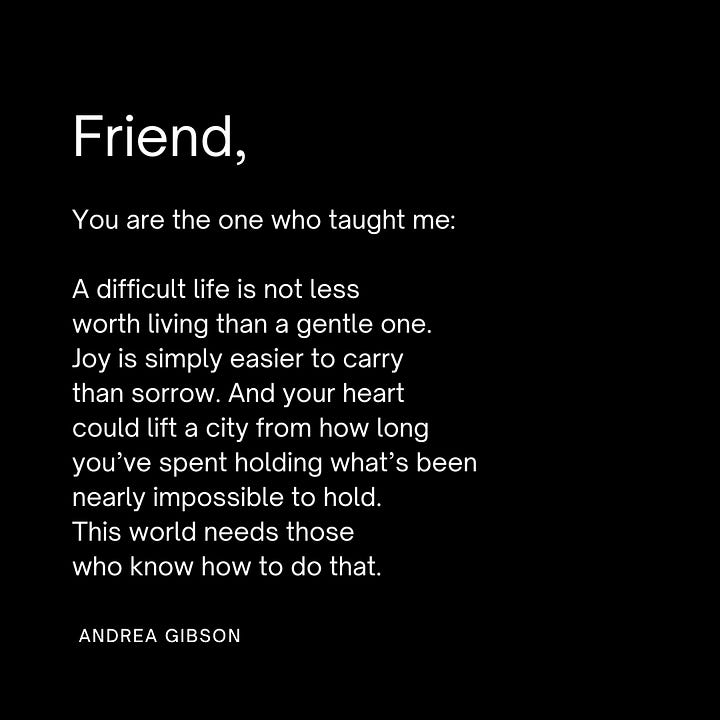Meg and I have an incredible local community. Fiercely loving people who have supported us through our biggest trials. For several years, that support came from a distance: researching medications, hunting down clinical trials, spending whole hours on the phone arguing with my insurance company. The day-to-day realities of illness, though, were something Meg and I largely handled alone. But when my symptoms started to worsen, we realized we needed more hands on deck.
So we sent out an SOS.
Every day after that, a friend showed up at our door in the form of a smile, ready to help however they could.
Before they came, friends texted Meg to ask what they could bring. “For the love of God, please bring Andrea your problems,” Meg texted back. “Andrea thrives when they’re helping other people.”
I didn’t know she’d said that. So I was quite confused when every friend who arrived at my bedside came carrying a heartbreak, a crisis, or a question they needed help answering.
“I’m still obsessed with my ex. Can you talk me down?”
“I’ve developed an anxious tic. What should I do?”
“I’m losing my mind as a parent. Will it ever get better?”
After about a week of this, I caught on. “Did you do this?” I asked Meg, side-eyeing her.
She smiled like someone who had absolutely done this.
“I just know you thrive when you’re being of service,” she said.
When I was in my mid-twenties, I wrote: The hardest thing about having nothing is having nothing to give. It was still true.
It wasn’t just the pain that made my days so challenging. It was the feeling that I had nothing to offer. That’s something not everyone understands about being sick. People see how much you need, but not how much you need to be needed.
Before Meg gave her little secret instruction, most friends assumed their problems were too petty to bring into a room with cancer. That instinct made sense. They didn’t want to add weight to an already heavy load. But what a relief it was to finally feel like I could reciprocate. That I could support them while they were supporting me.
Being the one who always needs help but isn’t asked to give it started to make me feel like a ghost in my own life. I didn’t want to be just a patient. I wanted to be a person. A person who reminded my friends of their wholeness, who made them realize how capable they were of facing their own pain.
Every time a friend left lighter than they came, I felt lighter too.
Meg knew what I hadn’t yet been able to say: that care went both ways. That being medicine for others is medicine to me.
Of course, there were days I didn’t have that in me. Days when I was simply too sick to have a conversation. In those moments I asked a friend who once lived with an illness even rougher than mine, “How do I feel like I have anything to give when I can barely get out of bed?”
She said, “Give love, Andrea. Then give more love. There is nothing in this life more powerful to give than that.”
Hearing her words, I felt my pulse shift. I was wrong in my twenties, when I believed in the idea of having nothing to give. Love. We always have love to give.
Love, Andrea 🖤
Thank you for being here.










This is not exactly what you are talking about, since I am a stranger to you, but ever since I watched Come See Me in the Good Light I have been wanting to tell you how much your words have meant in my life. I am so glad they included "Your Life," in the film. It's the first poem of yours I ever heard. I'm a 28-year-old trans man now but back then I was a lost, hurting, confused kid who thought he was the only person like me in the whole world. The only boy who was told he was a girl who wanted to spit out his own name and kill his god to fall in love and whose gender is an open road. Not much makes me cry anymore but that poem makes me cry every time. Words do not describe what it felt like to realize that I was not the only one, and that there might be a sweet and beautiful life for me, like you say at the end of the poem. You've made the world a different place, a better place, for me with your work. Thank you for shining your light so brightly that it reached me. I have such a sweet and beautiful life in so many ways now, and I like to think that my light is shining, too -- I have been a teacher, a coach, an athlete, a mentor, a writer, now a social worker. Things feel very dark sometimes for trans folks now. Thinking about all of our lights reflecting off each other, constellations growing and multiplying and finding each other, gives me hope. Sending love and power and light.
Andrea, my 12yo daughter Sarah loves you. She's autistic and was born with a rare genetic condition called Apert syndrome, and she keeps asking me how you're doing. She and I sometimes make videos together, when she asks me to.
I just wanted you to know that we love you and it's good to receive, just as you give so much to others and to us. ❤️